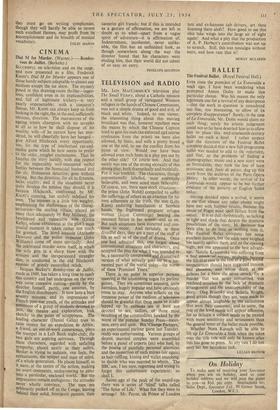TELEVISION and RADIO
MR. IAIN MACCORMICK'S television play The Small Victory, about a Catholic mission and a small group of variegated Western refugees in the hands of Chinese Communists, was not a simple drama of good and evil, of black and white. Indeed, to one viewer, the interesting thing about this moving broadcast was that, however repellent were the means by which the 'Chinese Captain tried to gain his ends (an enforced and untrue confession from the priest) we were also allowed, by hints, and with a pretty broad ,„ one at the end, to see the conflict from his point of view. Would one have been allowed even such hints in a play put out by the other side? Of course not. And that surely was one of the strong elements of this strong play, both dramatically and truthfully. For it was truthful. The characters, though conventionally labelled, were essentially believable, and were acted most believably. Of course, too, there were stock situations— the priest (John Welsh) compelled to suffer the sufferings of others as an exaction for his own adherence to the truth, the nun (Lilly Kann) enduring humiliation at heathen hands, the frightened pregnant refugee woman (Joyce Cummings) bearing the innocent future in her, womb—and so on. But such situations have occurred and con- tinue to occur. And certainly, in these dreadful days, they are a part of the stuff of life as well as of the stuff of drama. Once one had admitted this, one forgot about conventional situations and characters, and accepted the play for what it was intended to be, a necessarily compressed.and dramatised version of what actually goes 'otrin a tor- mented part of the world today—the \■orid of these 'Promised Years.'
There is no point in superiorS persons sneering at the astonishing vogue for parlour games. They are sometimes amusing, quite harmless, hugely popular and have obviously come to stay. Anyone who reflects on the immense power of the medium of television should be grateful that these items so avidly lapped up by millions are at least not devoted to sex, sadism, or those most revolting of the commodities hawked by the worst of the popular Sunday Press—mean- ness, envy and spite. But 'Change Partners,'
an experimental parlour game last Tuesday, really was embarrassing. Various groups of decent married couples were assembled
before a panel of experts (sic) who had, by the posing of painfully personal questions and the inspection of such mimes (sic again)
as hair ruffling, kissing and wallet snatching, to decide who was married to whom. The BBC are, I am sure, regretting and trying to forget this unfortunate experiment: so shall I.
Aeons ago at the peak of the sound-age there was a series of 'blind' talks called 'The Spice of Life.' What fun they were to arrange! Mr. Payne, oh Prince of London
taxi and ex-hansom cab drivers, art thou listening there aloft? How good to see this idea take wings into the large air of sight again! And what a pity that the production of A. P. Herbert's contribution was not up to scratch. Still, this was nostalgia without tears, and how rare that is!
MORAY MCIAREN


































 Previous page
Previous page